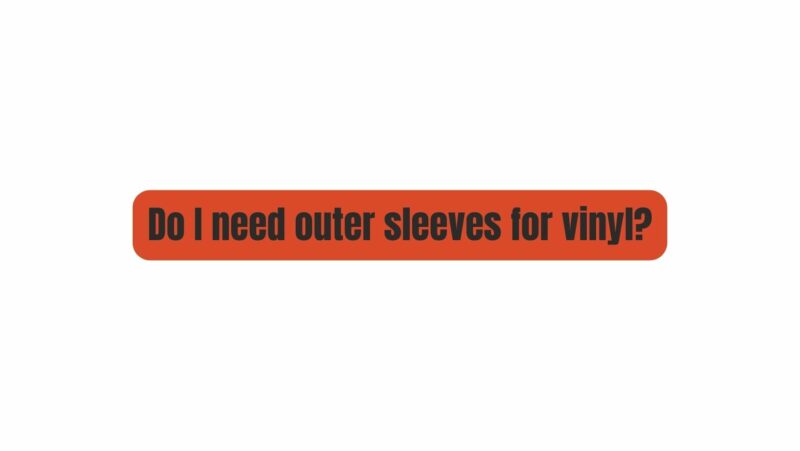Vinyl records have seen a remarkable resurgence in popularity, captivating audiophiles, collectors, and music enthusiasts alike. The tactile experience of handling vinyl, coupled with its warm and analog sound, makes it a cherished medium for many. However, as with any beloved collection, vinyl records require care and protection to ensure their longevity and optimal condition. One common consideration for vinyl collectors is whether to invest in outer sleeves for their records. Do you really need outer sleeves for vinyl, or is it an optional accessory? In this article, we will explore the reasons for and against using outer sleeves and help you make an informed decision about their role in your vinyl journey.
The Case For Using Outer Sleeves
- Dust and Dirt Protection: Perhaps the most compelling reason to use outer sleeves is their ability to shield vinyl records from dust and dirt. Records are highly susceptible to the accumulation of fine particles, which can nestle into the grooves and result in audible pops and crackles during playback. Outer sleeves act as a barrier, significantly reducing the risk of contaminants coming into direct contact with the record’s surface. This preservation of audio quality is paramount for many vinyl enthusiasts.
- Minimizing Surface Damage: Vinyl records are delicate and can easily suffer surface damage from scuffs and scratches. Outer sleeves provide an extra layer of protection, guarding records against abrasions that can occur during handling, storage, or transportation. They serve as a preventive measure, ensuring that each record remains in pristine condition.
- Preventing Ring Wear: Ring wear is a common issue, particularly with gatefold album covers. It occurs when the cardboard jacket rubs against the record’s label, resulting in a circular pattern of wear and discoloration. Outer sleeves create a protective barrier between the record and its jacket, effectively reducing the likelihood of ring wear. For collectors who value the visual appeal of their vinyl records, this protection is essential.
- Enhanced Long-Term Storage: Vinyl collectors often plan for the long term, with some records remaining in storage for years or even decades. During extended periods of storage, records are exposed to environmental factors such as humidity, which can lead to mold and mildew growth or dust accumulation. Outer sleeves provide an additional layer of defense against these environmental threats, helping to create a sealed, protective environment around the record.
- Maintaining Album Covers: Beyond preserving the vinyl records themselves, outer sleeves also safeguard the album covers and jackets. Vinyl records are not only about the music; they also encompass the visual and aesthetic appeal of the collection. By keeping album covers free from dust, moisture, and handling damage, outer sleeves help retain the overall condition and value of the records.
The Case Against Using Outer Sleeves
- Additional Cost: One of the primary considerations against using outer sleeves is the added cost. Outer sleeves are typically sold separately from vinyl records and can contribute to the overall expenses of collecting vinyl. For some collectors, especially those with extensive collections, the cost of purchasing outer sleeves for every record can be prohibitive.
- Aesthetic Preference: Some vinyl enthusiasts prefer the tactile experience of handling records without outer sleeves. They argue that the natural feel of vinyl and the album cover is part of the charm of collecting and playing vinyl records. For them, outer sleeves can create a barrier between the collector and the record.
- Storage Space: Outer sleeves can increase the bulk of a vinyl collection, requiring more storage space. This is a practical consideration for collectors with limited shelf or storage space. Additionally, handling records in outer sleeves can be less convenient when it comes to browsing and selecting albums for playback.
- Environmental Concerns: Vinyl records themselves are vinyl-based products, and some environmentally conscious collectors may avoid the additional use of plastic in the form of outer sleeves. In this context, using paper or polythene-lined inner sleeves might be considered a more sustainable choice.
Choosing the Right Outer Sleeves
For those who opt to use outer sleeves for their vinyl records, it’s essential to select the right type of sleeves. Here are some considerations:
- Polythene vs. Polyethylene: There are two primary types of outer sleeves—polythene and polyethylene. Polythene sleeves are typically thinner and less expensive, while polyethylene sleeves are thicker and provide better protection. Polyethylene is often favored for its durability and resistance to static.
- Anti-Static Properties: Look for outer sleeves specifically designed to be anti-static or consider using anti-static inner sleeves to prevent static buildup, which can attract dust and lint.
- Size and Fit: Ensure that the outer sleeves you choose are the right size for your records. While most standard records fit into 12-inch sleeves, smaller records (e.g., 7-inch singles) require appropriately sized sleeves.
Conclusion
The decision to use outer sleeves for vinyl records ultimately depends on individual preferences and priorities. While some collectors view outer sleeves as essential for protecting their records from dust, dirt, and wear, others may prefer the tactile experience of handling records without additional barriers.
It’s essential to strike a balance between protection and aesthetics when considering whether to use outer sleeves. If maintaining the pristine condition of your vinyl records is a top priority, carefully chosen and well-maintained outer sleeves can be a valuable asset in your collection. On the other hand, if you value the tactile experience of vinyl and prioritize its aesthetic appeal, you may opt for alternative storage and handling practices.
In the end, the love of vinyl records extends beyond their physical condition. Whether you choose to use outer sleeves or not, the joy of vinyl lies in the music it delivers and the connection it fosters between the listener and the artistry of the record.


